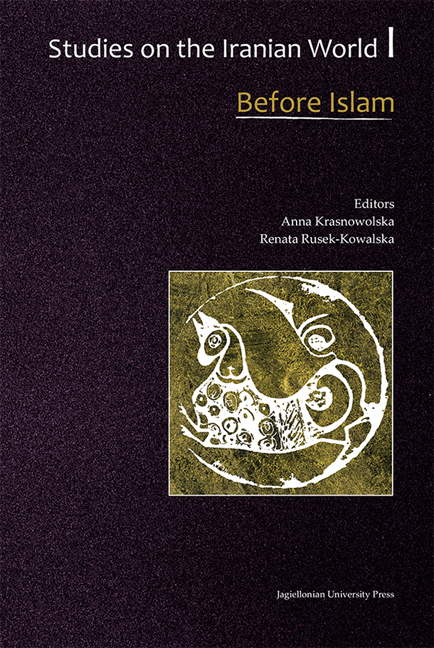Book contents
- Frontmatter
- Contents
- Foreword
- Linguistics
- The Old Persian Genitive. A Study of a Syncretic Case
- Nominal Compound Strategies in Middle Iranian Languages
- Alan Place-names in Western Europe
- Work in Progress: The Catalogue of the Buddhist Sogdian Fragments of the Berlin Turfan Collection
- Preliminary Remarks on Middle Persian ‹nc› in the Pahlavi Documents
- Literature
- Religion
- History
- Archaeology
Alan Place-names in Western Europe
from Linguistics
Published online by Cambridge University Press: 12 January 2018
- Frontmatter
- Contents
- Foreword
- Linguistics
- The Old Persian Genitive. A Study of a Syncretic Case
- Nominal Compound Strategies in Middle Iranian Languages
- Alan Place-names in Western Europe
- Work in Progress: The Catalogue of the Buddhist Sogdian Fragments of the Berlin Turfan Collection
- Preliminary Remarks on Middle Persian ‹nc› in the Pahlavi Documents
- Literature
- Religion
- History
- Archaeology
Summary
SUMMARY
Information about the Alans can be found in several sources of the ancient world, but also in medieval and oriental texts. Nevertheless, Alan history has been unclear up until now, especially the history of the Alans in the West. The first works on Alan history in Western Europe belong to the 20th century and it is not by chance that Rostovcev underlined that the role of the Alans in the conquest of the Roman Empire had been neglected for a long time. The Alan place-names in Western Europe help us to understand in a better way the role the Alans played in Europe during the so called Völkerwanderungen. The difference between the Alan place-names in Western and Eastern Europe also shows us that the ethnic situation in Northern Caucasus in the first millennium should be further investigated. This also assists us in working out if the ethnonym As is really only the medieval name of the Alans living near the Caucasian ridge or if a more complex situation, as Arabic sources seems to suggest, is to be considered.
Very often place-names tell us much more than we previously thought. Sometimes they tell us about almost forgotten or not correctly understood pages of history. Alan place-names in Europe belong to this group; they tell us what history books often leave out: the real role the Alan people played during the period of the Völkerwanderungen. And it is really incredible that nowadays, while every schoolboy knows the important role played in Europe by Longobards, Goths and Huns during the last century of the Western Roman Empire, if we talk about the Alans – Great Danes (called Alan dogs in Italy) are the first and often the only thing that one remembers. But apart from the connection between Alans and dogs, we have to recall what Rostovcev wrote in Iranians and Greeks in South Russia. And not by chance did Thordarson begin a relevant article about Alan place-names in France using Rostovcev's words.
Alan history is a long and very complex one; but it is, above all else, a history of migrations. If it is true that Alan's homeland is traditionally identified with Northern Caucasus, a place where, till now, the Ossetians – considered their descendants from the first half of 19th century – live, it is clear to everybody that the Alans are not natives of this region.
- Type
- Chapter
- Information
- Studies on the Iranian World: Before IslamMedieval and Modern, pp. 51 - 58Publisher: Jagiellonian University PressPrint publication year: 2015



